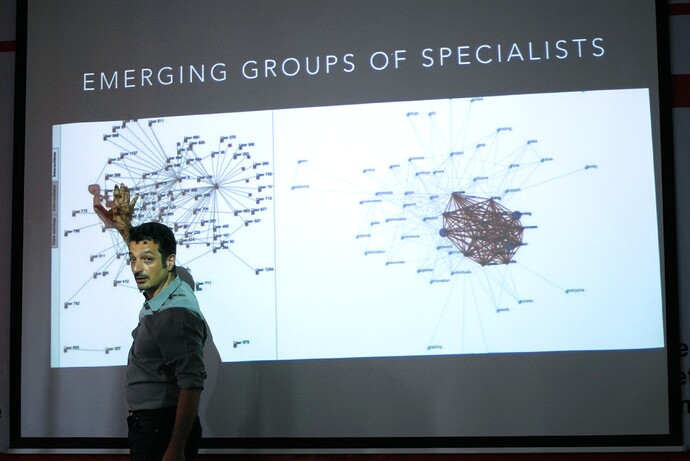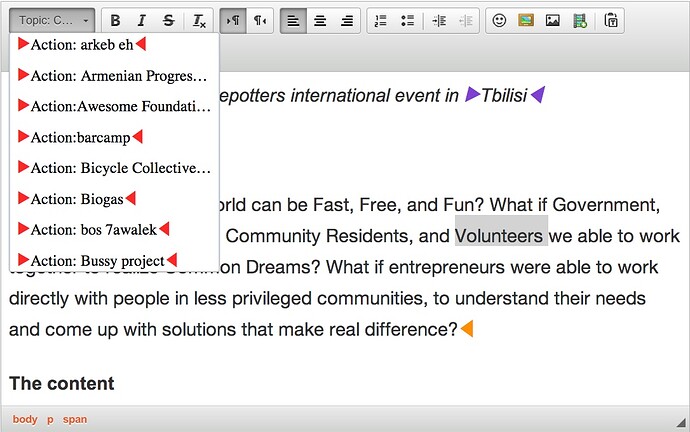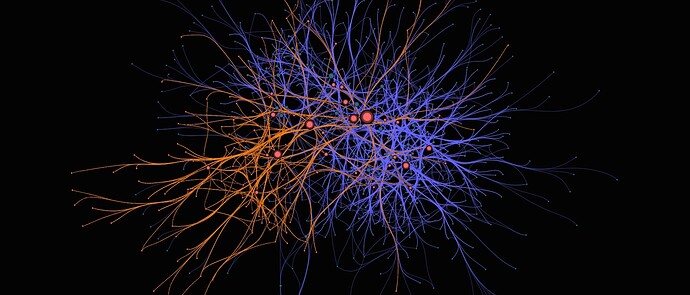We in Edgeryders do a great many things with technology, lifestyle, politics and just plain fun. But where does it all go? Since we have no hierarchy and no formalized goals, it is not clear in which direction our activities and interactions are taking us.
I am seeing a pattern. I think we are on our way to becoming the first-ever community to develop its own collective intelligence based on a proper data strategy. Let me unpack this statement.
Edgeryders is an engine of collective intelligence
We use open online conversations to explore issues and produce new knowledge around them. The idea is to seed a conversation on some issue of interest to people on the edge; place it on the Internet, where it is relatively simple and cheap to communicate; and throw the doors wide open for everybody to step in. Self-selection attracts people who are interested in the issue in question; skilful community management incentivizes high-quality contributions; and a large social media footprint helps recruit a continuous flow of new people. Then ethnographers go through the content and construct a synthesis of what is being said. This invariably produces surprises and important insights: the whole is greater than the sum of the parts. Collective intelligence is at work.
We have done this from the start. Here’s the news: we are taking it to a whole new level. Both the technological and the human subsystems have undergone a major upgrade.
The Edgeryders conversation is encoded in structured data
@Matthias has come up with a way to enable ethnographic coding directly on the Edgeryders platform. It works like this: a researcher highlights a snippet of text and select an ethnographic tag from a drop-down menu of pre-loaded list of tags. This tells the software that this particular quotation is about, say, “bicycle collective”. The researchers visualize this text as bracketed between small triangles, color-coded for categories. Like this:
Simple, right? And yet, this move transforms lumps of text on Edgeryders into well-structured qualitative data. Because:
- Content in Edgeryders is associated to people and to other content. Tagging it on the platform does not break those association links. Researchers can ask the database questions like “show me which participants are talking about, say, "bicycle collective" in an interactive conversation”. This tells them whether the talk about bicycle collective tends to be in solitary rants (not much community validation) or in participated conversations (high community validation). Or they could want to know what else the same people mentioning “bicycle collective” are also talking about. Or whether there are clusters of people forming around groups of issues. When we have fully developed the tech, this will be way more powerful than standard software-powered ethnography.
- Tags and categories are themselves database objects, and they are formed according to an algorithm that makes them compliant with a standard called RDFa. That means our ethnographic codes are part of the Semantic Web. We may have our own SPARQL endpoint a year from now! And that, plus our open data policy, means that researchers anywhere can run their own analysis on our data, proposing new interpretations and enriching the conversation with them.
- We have built social network analysis capacity and awareness. Thanks to Edgesense (a Wikitalia project), we now have real-time social network analysis of the whole Edgeryders conversation. This enables community managers to detect disconnected individuals and emerging clusters of conversation; plus, it augments semantic data. For example, network scientists consider a measure called eigenvector centrality to be a marker of authoritativeness in some circumstances. We can check for the eigenvector centrality value of people writing about “bicycle collective”, and give more weight to what they say.
Network analysis in Edgeryders: The Spot The Future conversation (orange) shows structural coherence, while still connected to broader community
Edgeryders are master collaborators
Technology is nothing without the people driving it, and sure enough the world is full of empty platforms. In Edgeryders, we take great care of upholding a culture of collaboration and sharing. We do that because we are fully aware that most people in the community have very little in the way of money and power: the most precious resources the 99% can deploy towards our vision of change is each other. The ability to collaborate is a key enabler, perhaps the key enabler. So, we insist on tasks and issue tracking; we properly document offline meetings so that people who are not in the room are included and can jump on board at any time.
Our vision is to train each other to become the best collaborators/sharers in the world. Collaboration comes down to doing things that make others better and faster as we work towards a shared goal. One of those things is taking time to share some insights or information. If everyone around us does the same, we are all better off; but it is not easy to maintain such generous behavior. Like all humans, we are short on time, biased and lazy. In Edgeryders we try to incentivize collaboration by investing our own time to make people better at collaborating. We do onboarding community calls, upskilling sessions at our event and our world-famous Call a Human button (bottom of the home page). We are also working on an community-scale takeup of Makerfox, with its network barter algorithm, as a way to allocate tasks in massively collaborative efforts.
There is a price to pay for all this: we have to interact on the Edgeryders platform for the magic to happen. Fragments of conversation that default to email, or bleed onto Facebook, are lost, or sequestered in proprietary corporate datasets. They will still be analyzed, but the purpose of that analysis will be to profile you and sell you stuff. We cannot use them to make sense of it together. We cannot use them to generate results that we can package and sell, to pay for your expertise. They are back to being inert lumps of text, except where selling you stuff is concerned.
People complain to us at times. They find Edgeryders big and messy, difficult to navigate, occasionally buggy. We work hard to hunt down bugs, improve user experience and keep good documentation, but let’s face it: we will never be able to throw at the website amounts of manpower comparable to Facebook or Linkedin. You have to make some small extra efforts. In return, we can keep it open; steward your data (with @Matthias taking personal responsibility for ethical behaviour of Edgeryders-related research); augment them with analytics; deploy our collective intelligence towards attacking important problems instead of selling watches or cosmetics; even send paid and relevant work to community members. But only as long as we keep those interactions – and the data they generate – on the Edgeryders platform.
If you find the deal acceptable, hang in there. Really interesting times are coming.


